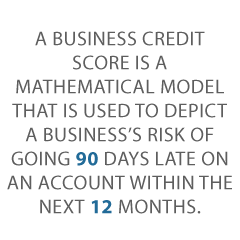There are many differences between personal credit scores and business credit scores. When it comes to personal credit cards vs business, using personal credit card for business can hurt you. More on that later.
All Differences Between Personal Credit Scores and Business Explained Right Here
We get asked this question all the time – what are the differences between personal credit scores and business credit scores? Sit tight because we’ve got you covered. We’re even going to show you how to build business credit.
Differences Between Personal Credit Scores and Business: Time Frames  Under Consideration
Under Consideration
One of the fundamental differences between personal credit scores and business scores is the time frame the scores gauge someone’s risk of default over. The time frame for business credit vs personal credit is different.
A business credit score is a mathematical model that is used to depict a business’s risk of going 90 days late on an account within the next 12 months.
A consumer credit score is a mathematical model that is used to depict a consumer’s risk of going 90 days late on an account within the next 24 months.
Hence when you are looking at business vs personal credit card, the time period for referenced on a business credit report is half as long as for consumer.
Differences Between Personal Credit Scores and Business: What the Scores Represent
Another big difference between consumer and business credit scores is what the score in a business credit check actually represents.
A consumer credit score reflects an individual’s likelihood of defaulting on an obligation.
A business credit score reflects the business’s likelihood of defaulting on an obligation, not the business owner’s.
The business credit score is based on how the business obligations are being paid, not how the business owners pays their personal obligations. Hence when looking at business credit card vs personal, the business owner’s spending and payment habits are only under consideration for the latter.
Differences Between Personal Credit Scores and Business: Scoring Ranges
Another major difference between business and consumer credit scores is the score range in business credit reports.
Consumer FICO scores range from 350-850 with 850 being the best score you can get. Business credit scores typically range from 0-100 with 100 being the best score you can get.
There are three of many major differences between personal credit scores and business credit scoring. And what’s most important about these differences between personal credit scores and business credit scores is you need to separate the two. This is part of how to establish business credit.
But How Do You Separate Business and Personal Credit?
Whether you have a new business, or you are now involved because you paid for one or have suddenly become an owner or a manager here are several reasons why you should really develop your business credit. Another reason is it’s how to have business credit with personal guarantee vs without. So here is how to build business credit.
Get a Dun & Bradstreet D-U-N-S number
You can’t get into Dun & Bradstreet’s system without having one, and they are totally free, anyway. A Dun & Bradstreet DUNS number differentiates your small business from all others, including similarly-named companies. Dun & Bradstreet has a prerequisite that you register your small business on their site before they will provide a D-U-N-S number.
Please note: there are a few marginally different ways of getting a DUNS if your company is in a particular class. These include if your company is a United State government contractor or grantee, or your company is Canadian, or you are doing work as an Apple developer.
File a DBA
If you operate your business as a sole proprietor at least apply for DBA (‘doing business as’) status. If you do not, then your actual name will wind up being the same as your business name. Consequently, you can still find yourself being directly obligated for all your small business financial obligations.
Keeping separate means you can pay with a self employed business credit card vs personal—more on that later.
But don’t look at a DBA filing as being anything more than a steppingstone to incorporating.
Create a Separate Business Entity
The very first thing you need to know is how lenders are thinking. Banks and the like regularly ask for personal guarantees because they know you but not your small business. And your credit score has, as well, probably been around a lot longer than your small business’s has.
Additionally small, new businesses typically see a commingling of cash with personal accounts. If your business is not fetching the cash immediately, a business owner will often float a loan to the business, with or (more commonly) without interest.
This commingling of funds is not doing you any good when it pertains to attempting to get a credit line. It is clearly creating confusion with creditors. Accordingly they want a personal guarantee because, to them, you and your business are one and the same.
The best way to tell to all and sundry that you and your small business are not the same is to create an independent business entity.
The Internal Revenue Service recognizes what you need. Your first stop is on their site, in order to get an EIN (your company’s identification number for tax purposes).
Apply online after you determine your eligibility. All you ought to know are the answers to two questions: does the person applying online have a valid Taxpayer Identification Number (SSN [Social Security Number], EIN, or ITIN [Individual Taxpayer Identification Number]?
And: is your primary business established in the United States or in U.S. Territories? If you can respond ‘yes’ to both questions, then you are eligible.
The next step is to select the type of business entity you want: sole proprietorship; partnership; corporation; or a limited liability corporation (LLC).
The Best Business Entity
We prefer corporations. And you should, too! Corporations are legally distinct from their owners. And this is the case even when a corporation has one employee. Or just one owner. Or they are the same person.
Whether you choose a C-corporation, an S-corporation, or an LLC is your choice. We highly recommend consulting with a lawyer or a competent tax professional to find out what is the best possible choice for you.
Differentiate Your Business Credit From Your Consumer
Even when you are a sole proprietor (let’s say you retail a specific thing handmade by nobody but you), it will still help, big time, for you to construct a financial barrier between your consumer credit and your business credit. Why?
Because keeping a barrier means that your personal credit will not be influenced by your business credit. You don’t stand to lose a car, for example, if your business goes into receivership.
This is a way to leverage the differences between personal credit scores and business.
Save Your Personal Credit For Your Own Expenses
If you’re asking, “Can I use personal credit card for business?” the answer is technically yes. But you don’t want to be doing that.
Don’t let the yes answer to “Can you use a personal credit card for business?” and the no answer to “Is it illegal to use a personal credit card for business?” fool you.
Even if you pay each one of your business’s invoices promptly, each and every time, you aren’t doing yourself any favors by using your personal credit cards (or other accounts such as a checking or savings account) to settle business debt.
How come? Because the two forms of credit scores are impacted by what’s known as the Credit Utilization Rate. This is just an uncomplicated computation of the credit you’re using. So this is divided by your total available credit. You want to keep this ratio at about 30% or less.
As a result, if you are using personal credit cards for business expenses, you are inflating your credit utilization rate.
If you bring it above the 30% benchmark, then your personal credit score will be detrimentally affected even when you are diligent about satisfying your company debts. This is not what your personal credit card is for.
Set Up a Credit History Before You Really Need to Tap It
Why use a business credit card vs personal? One of the reasons is to build a credit history.
For the big credit reporting agencies (Experian, Equifax, and Dun and Bradstreet; you know, all the sites you know of where to check a business credit score), credit history is one of the components they use when determining your business credit score. The longer (and better) your credit history, the better your small business’s credit score is going to be.
When you regard what credit score needed for a business loan, then you need every bit of your credit score you can get. If you begin early, it can only help you.
Get Ready For Lean Times
You may not wish to ponder it, but there are going to be instances when the work runs out. If you are in a seasonal business, then this is a part of the DNA of your organization.
But every firm can endure leaner times. If you need to make payroll or equipment payments, or just cover the rent, you are going to be in need of business credit in order to get by. And by building your business credit before you actually need it, you are much more likely to get superior terms – or even credit at all.
The IRS Says You’re a Business (or Perhaps Even a Corporation). Now Start Acting Like One
What does this mean? If you have been smart and set up your organization with an EIN (employer identification number), then at some point in the process you needed to disclose to the Internal Revenue Service that your small business is, certainly, a genuine business and not just a leisure pursuit or such.
As a result, the IRS is actually treating you and your small business independently when it comes to tax liability. For that reason, if you’re still floating interest-free loans to your business with your consumer credit cards, then now is the time to cut that out.
And by the way, don’t fund your business with a personal line of credit vs business line of credit – you want these to be separated 100%.
Commingling Funds Can Trigger An Audit
So stop using personal credit cards for business. And the corollary is also true: don’t use a business credit card for personal use. Because using business credit card for personal use is almost as bad.
These aren’t personal business cards. And the last thing you want to be doing is commingling funds. The IRS doesn’t like that. So, can you split one credit card to show business expense vs personal when using?
Even if you could, don’t. Simplify your life and don’t confuse the IRS. This is even true for a sole proprietorship business vs personal credit card. When it comes to business credit card vs personal credit card, don’t put them together.
The IRS is not going to be checking personal credit card vs business credit card. They will just know you are using personal credit card for business expenses and
Vendor Credit is a Wonderful Thing and You Should Use It
What is vendor credit? It’s where you work straight with a vendor in order to create a relationship through which you can have a modest loan (that is, credit). They float it to you for the kinds of things you need day in and day out.
We know of many places where you can build vendor credit. And they will report to the business credit reporting agencies! This is where to build business credit! See: https://www.creditsuite.com/blog/5-vendor-accounts-that-build-your-business-credit/
So, what is a business credit card? It can come from a vendor. It doesn’t have to be a Visa or a MasterCard.
Business Credit Means You Can Sooner or Later Get Bank Loans for Your Company
Sometimes, a business opportunity is simply too good to pass up, and you should take action immediately. This could be anything from getting real estate at auction to getting the machinery owned by a business going through reorganization, to bidding on raw materials when they reach their best price for the year.
However, you may not have that kind of funds handy. Building business credit means that you get bank loans faster and with better terms. You will have the opportunity to capitalize on these opportunities, and seize them when they are still relevant.
Without business credit, despite the fact that you get a loan, it will certainly take longer – and someone else might buy those economical raw materials or outbid you when it comes to prime real estate.
Differences Between Personal Credit Scores and Business: Scoring Takeaways
Start building business credit as soon as you can and reap the benefits long afterwards. There are differences between personal credit scores and business credit scores!

